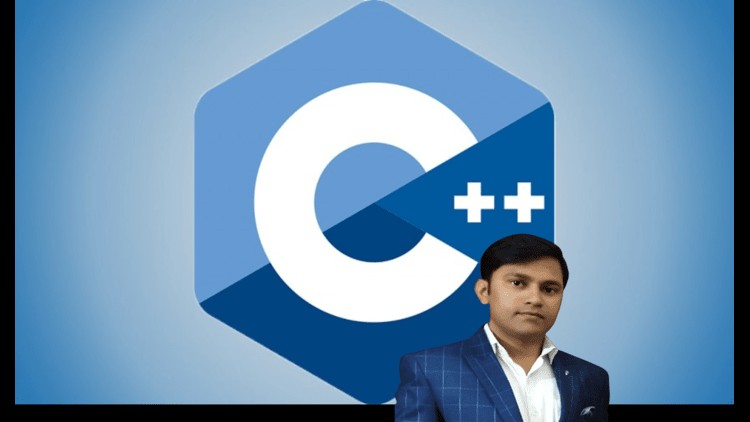
Basics (All Fundamentals to Start C++ programming)
-> History and Features of C++
-> C++ Terminology
-> How To Write C++ Program
-> Required Softwares and Installation
– Turbo C++ IDE (with 16 bit Compiler)
– Dev_CPP IDE (with 32/64 bit Compiler)
– Code_Blocks IDE (with 32/64 bit Compiler)
-> Function Introduction
-> Introduction to “cout” and “cin” Objects
-> Writing First Program in C++
-> Tokens
-> How To Take Input From User
-> Comment lines
Flow of Control (With Practical Examples and Assignment)
-> Decision Control Introduction
-> If statement
-> Ladder if statement
-> If else statement
-> Nested if statements
-> If else if statement
-> Dangling Else Problem
-> Conditional Operator
-> Switch Statement
-> Iteration Statements (Loops)
-> Concept of for loop + Assignment
-> Concept of while loop + Assignment
-> Concepts of do-while loop + Assignment
-> Loops differences
-> Nested Loop + Assignment
-> Variations of Loops
-> Jump Statements
– break
– continue
– goto
– exit() function
Pointers
-> Introduction to pointer
-> Concept of memory address
-> Referencing and dereferencing operator
– & (address of variable)
– * (value at address)
Functions ( All Concepts With Practical Examples)
-> Introduction to Built-In Functions and User Defined Functions
-> Types of User Defined Functions
– With No Arguments and No Return Value
– With No Arguments but Return Value
> Who calls main() function ?
– With Arguments but No Return Value
– With Arguments and Return Value
-> Important points about function
-> Prototype declaration not necessary
-> Local variables and Global variables
-> Default Arguments
-> Actual Arguments and Formal Arguments
-> Call By Value
-> Reference Variable
-> Call By Reference
Type casting and Type conversion
How to use Dev_CPP IDE and Code_Blocks IDE
Some Standard Headerfiles and Built-In Functions
Array
-> Introduction and Types of Array
– One dimensional Array + Assignment
> Array and Pointer (How Pointer Works With Array)
– Multi Dimensional Array (2D Array) + Assignment
“new” and “delete” operators
-> Concept of SMA and DMA
String
-> Introduction
-> How to Input String From User
– Using “cin” Object
– Using “get()” function
– Using “getline()” function
-> Built-In Functions
-> Some Examples
Structure
-> Introduction
-> Use of public, private and protected keywords
-> Define Member Functions Outside The Structure
-> Array of Structure
-> Local Structure
-> Nested Structure
-> Passing Structure into Function (Call by Value)
-> Passing Structure into Function (Call by Reference)
Union
-> Introduction
-> Constructor and Destructor in Union
Enumeration
OOP(Object Oriented Programming) Concepts
-> Encapsulation and Classes and Objects
– Introduction
– Difference Between Class and Structure
– Define Member Functions Outside The Class
– Static and Non Static Members
– Concept of “this” Pointer
– Array of Object
– Pointer to Object
– Local Class
– Nested Class
-> Constructors and Destructor
– Introduction
– Types of Constructors
> Implicit Constructor
Default
Copy
> Explicit Constructor
Default
Parameterized
Copy
– Destructor
-> Friend Function
– Introduction
– Friend as a Bridge
– Friend Class
-> Inheritance (Reusability)
– Introduction
– Visibility Modes
– Types of Inheritance
– Constructor in Inheritance
– Function Overriding
– Pure Virtual Function and Abstract Class
-> Polymorphism
– Introduction
– Types of Polymorphism
> Compile Time
Operator Overloading
Function Overloading
> Run Time
Virtual Function
String class
Namespaces
Exception Handling
-> Introduction
-> Try and Catch Block
-> Nested Try Block
-> Specifying Exceptions in Function
-> “terminate()” and “set_terminate()”
-> Exception Handling (With Class and Inheritance)
File Handling
-> Introduction
-> Writing operation
-> Reading operation
-> File Opening Modes
-> Text File and Binary File
-> “write()” and “read()”
-> File Pointers
-> Read File (Example)
-> Append File (Example)
-> Update File (Example)
Template
-> Introduction
-> Function Template (Examples)
-> Class Template
-> Define Data Members and Member Functions
-> Template and Inheritance